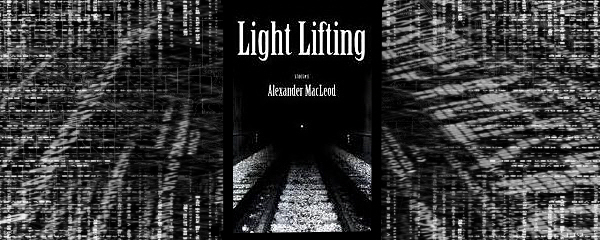
by Mary Jo Anderson
‘I’m obviously thrilled and surprised and almost stupefied that this little book made it through everything to get on the Giller List,’ explains Alexander MacLeod by email, about his debut short story collection, Light Lifting (Biblioasis, $19.95). There is nothing little about this book, except perhaps the small, independent press, Biblioasis, which published the book. Though this is MacLeod’s first book, and he is up against some veteran writers for the Scotiabank Giller Prize (including Douglas Coupland and Jane Urquhart), he has been writing for many years. ‘The first story…was completed in 1997 so it took me 13 years to get to this point. I’ve been writing since I was in High School, and I published my first story when I was 21 years old, a long, long road to this destination,’ writes MacLeod.
‘Miracle Mile’, the first story in this miraculously superb collection, opens with the conjuring of ‘a moment in history’ on ‘the day after Mike Tyson bit off Evander Holyfield’s ear.’ Mikey, and his life-long friend, Burner, are in limbo waiting for the start of a track-meet where they are to compete in the 1,500-metre race. Television stations endlessly air the grisly visuals of Tyson’s ‘rawest impulse’; the channels ‘churn it around and around, the same thirty-second clip of the fight. It was like watching the dryer roll clothes.’
Before every race, Burner will always ‘zone out and go way down into himself and stay there perfectly silent for long stretches, staring off to the side…’ Mikey accepts Burner’s behaviour: ‘When you get right down to it, even the craziest ritual and the wildest superstition are based on somebody’s version of real solid logic.’ There is a moment mid-stride when a runner has both feet off the ground. In each of the seven stories in this collection, the lives of the main characters are illuminated to reveal those pivotal moments where nothing is solid beneath their feet.
Mid-air can mean either falling or flying – and the stories find characters experiencing both, as the action spirals through past, present and towards an implied future. In ‘Miracle Mile’, Mikey explains the necessity for a runner to pare down his life to pare down his time by fractions of a second. You can’t run and do anything else; there is only running. Lapping Mikey’s present is his past – the ‘grade school track-meets’ where the pure joy is ‘how it always should be.’
What is true in this story is true in all the stories – the subtle structuring embodies both the themes and the emotions of the narrative. The oscillating timeframes bring us to and away from the threshold again and again. And the worlds in which we are immersed are so concretely and completely realized, so visceral. These are stories of the liminal experiences in a life, the moments that coalesce to create ‘what we were and what we are’ and yet they are as solid as a punch.
The evocation of inner experiences has almost never been so grounded in the everyday. These are stories in which people work, in which daily life is impeccably realized. The psyche arises from the physical. In ‘Wonder About Parents’, a young father tells of the delousing of his family to stop a recurring problem with lice – brought home from school. He reads a 1934 volume by Hans Zinsser that details the conjoined history of humans and lice. The story has its own history – of the man meeting his future wife, of a dangerous drive at Christmas to take their first-born child home to his parents’ house, of the fears that the latest Pandemic scare ignites.
In ‘Light Lifting’, it is manual labour, brick laying, that grounds the story. In ‘Adult Beginner 1’, the daily cleaning of swimming pools is vivid and slightly sickening; ‘WHMIS-approved disinfectants squirted into the urine-soaked corners of the bathroom walls…rodent-seized nests of woven anonymous hair scooped from the filter traps…’ And again we see ‘the way work works’ in the final story, ‘The Number Three’. A man has spent his life in a factory that built ‘the number-one selling minivan…’ His kids ‘grew up riding’ in the back of the family’s successive vans. The first sentence of ‘The Loop’ describes the tricky business of riding a bicycle in the snow. You have to ‘Stand up on the pedals and push down hard on the front wheel…’ Allan is a public school student with a part-time job delivering for a pharmacy owned by an inconsiderate man named Musgrave. Many of the people to whom Allan delivers the prescriptions and sundries are elderly people. After the three years he has pedaled his bike across town Allan realizes he ‘knew too much about things I wasn’t really supposed to know at all.’ Allan tells us how to navigate a bike in snow. The stories in Light Lifting reveal to us how people try to navigate through fear, and loss, through childhood and age.
It is the understated accretion of detail, the finely structured telling, the revelations and epiphanies – ‘Fear is our most private possession’ – and the deep emotional power that create the magnificence of these stories. What an explosion of talent. Concrete details ground these stories but emotional and psychological veracity are what lift them.
The Scotiabank Giller Prize is one of Canada’s two major literary prizes with an award of $50,000 to the winner. Light Lifting is one of two story collections to be shortlisted this year. Our congratulations go to Alexander MacLeod and also to Sarah Selecky for her shortlisted collection THIS CAKE IS FOR THE PARTY, Thomas Allen Publishers .

